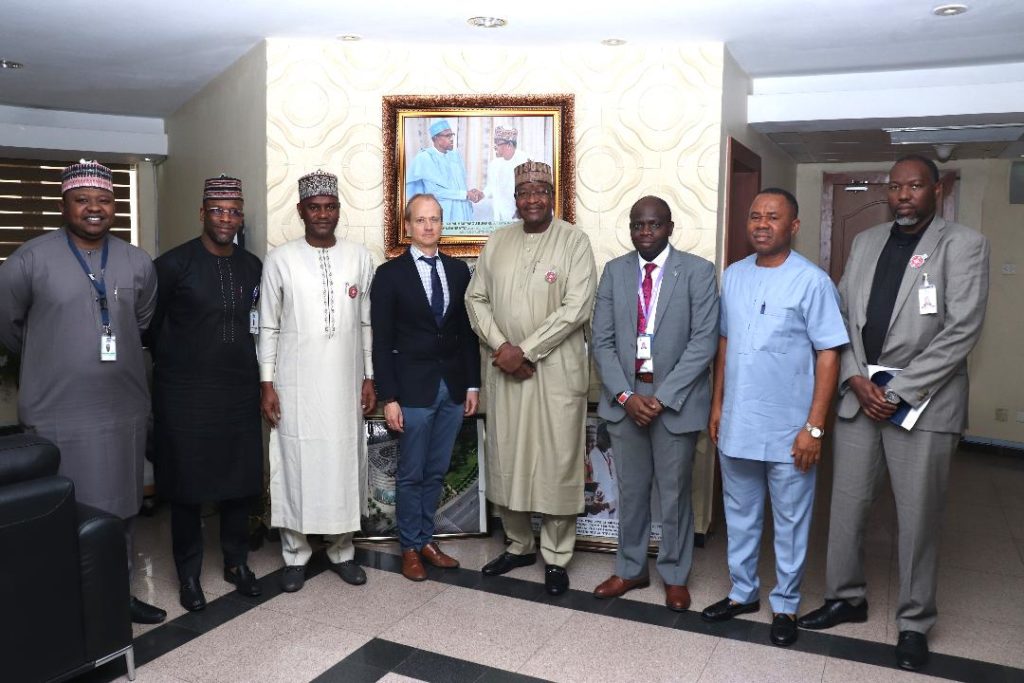
L-R: Senior Officer, Public Affairs Department, Nigerian Communications Commission (NCC), Hamzat Shuni; Principal manager, Special Duties, NCC, Ibrahim Galadima; Chief of Staff to the Executive Vice Chairman (EVC), NCC, Usman Malah; Swedish Ambassador to Economic Community of West Africa (ECOWAS) – Ghana, Cameroon and Nigeria, Mr. Carl Grans; EVC/CEO, NCC, Prof Umar Danbatta; Director, Government and Industry Relations, Ericsson, Mr. Peter Ogundele; Deputy Director, Special Duties, NCC, Mr. Chukwuma Azikiwe; and Assistant Director, Special Duties, NCC, Mr. Babagana Digima during the visit of the Swedish Ambassador to the Commission
The Nigerian Communications Commission (NCC) is considering exploring the capacity development and focus of the Swedish Programme for ICT Development in Emerging Regions (SPIDER), to improved broadband development in Nigeria.
The SPIDER is a center at the Royal Technical University (KTH) in Sweden that mobilizes a network of Swedish and international experts on Information and Communication Technologies for Development (ICT4D) to help developing countries use ICT effectively and strategically to advance core development and poverty-reduction goals.
NCC on Thursday (9th January 2020) hosted the Swedish Ambassador to ECOWAS, Ghana, Cameroon and Nigeria, Mr. Carl Grans at its Head Office with discussions centering on how the country can enhance Information and Communication Technology (ICT) capacity development and broadband penetration in Nigeria though the Swedish offer.
This is in line with the Commission’s 8-Point Agenda, one of the pillars of which focuses on Strategic Collaborations and Partnership towards accelerating digital access and skills development in the country.
While receiving the Ambassador and team, Prof. Umar Danbatta, the Executive Vice Chairman (EVC) of NCC, said the meeting was at the instance of the Commission, based on the Commission’s assessment of the offer for capacity development and focus of the Swedish Programme for ICT Development in Emerging Regions (SPIDER), a dedicated programme instituted to provide capacity building in emerging markets.
Professor Danbatta said that the Swedish Post and Telecom Authority (PTS) had earlier trained some Nigerians. Thus, Danbatta stated that further collaboration to build capabilities of Nigerians on ICT will increase human resources and capacity in the ICT sector towards deepening broadband penetration.
The EVC stated that further capacity building of Nigerians on ICT tools and skills will start with agencies in the Federal Ministry of Communications and Digital Economy (FMoCDE) in the context of train-the-trainer arrangement, and the beneficiaries in the agencies will proceed to train other Nigerians.
Responding to the EVC, Ambassador Carl Michael Grans said that “5G technology and Internet of Things (IoT) are crucial to transforming the industry and production in a way that can’t really be seen yet, but a digital revolution is really imminent worldwide”. Grans acknowledged that Nigeria is ready for the digital revolution considering the approval given to conduct 5G tests recently.
Professor Danbatta thanked the Swedish government for the capacity building programmes and reiterated that one of the priorities of the Nigeria Government is to facilitate the migration of millions of Nigerians out of poverty traps through ICT capacity development, skill impartation and effectively driving the digital economy processes.
“We hope that the Embassy will continue to facilitate this kind of intervention to NCC and other agencies of government in Nigeria and Africa, and we also hope to benefit from the wealth of experience especially of Sweden, being a leading broadband market,” the EVC said.













